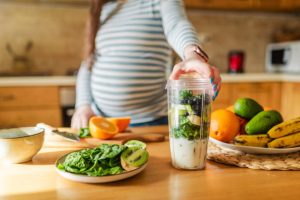
🥗 Safe Foods to Include in Your Pregnancy Diet
1. Fruits and Vegetables
Loaded with vitamins, fiber, and antioxidants, they should be a daily staple.
- ✅ Safe choices: Apples, bananas, oranges, berries, carrots, spinach
- ⚠️ Tip: Wash all produce thoroughly to remove pesticides and bacteria.
2. Whole Grains
They provide energy and aid digestion.
✅ Options: Brown rice, oats, quinoa, whole wheat bread
3. Protein-Rich Foods
Protein supports fetal tissue and brain development.
✅ Safe proteins: Cooked lean meats, eggs, tofu, lentils, chickpeas, fully cooked seafood like salmon or cod
4. Dairy and Alternatives
Calcium and vitamin D are crucial.
- ✅ Choices: Pasteurized milk, cheese, and yogurt
- ⚠️ Avoid: Unpasteurized dairy
🚫 Foods to Avoid During Pregnancy
1. Raw or Undercooked Meat, Eggs & Seafood
Can carry harmful bacteria like Listeria, Salmonella, or Toxoplasma.
❌ Avoid: Sushi with raw fish, soft-boiled eggs, rare steak
2. Unpasteurized Dairy and Juices
They increase the risk of bacterial infections.
❌ Say no to: Brie, feta (unless labeled pasteurized), fresh-pressed juices
3. High-Mercury Fish
Mercury can harm the baby’s nervous system.
- ❌ Avoid: Shark, swordfish, king mackerel, tilefish
- ✅ Safer alternatives: Salmon, tilapia, canned light tuna (in moderation)
4. Deli Meats and Pâtés
Risk of Listeria contamination.
❌ Avoid unless reheated until steaming hot.
🥤 Safe Drinks During Pregnancy
✅ Drink Plenty Of:
- Water: 8–12 cups/day to stay hydrated
- Pasteurized milk or fortified plant-based alternatives
- Fresh smoothies (with pasteurized ingredients)
- Herbal teas like ginger, peppermint, and rooibos (limit to 1–2 cups/day)
🚫 Avoid or Limit:
- Caffeine: Limit to under 200 mg/day (≈1 cup coffee)
- Alcohol: No amount is proven safe during pregnancy
- Unpasteurized juices
- Energy drinks: High in caffeine and additives
📝 Final Tips
- Always read food labels and ask when unsure
- When eating out, ensure food is hot and freshly cooked
- Consider prenatal vitamins to support any nutrient gaps
- Consult with a registered dietitian or obstetrician
👶 Conclusion
Your diet during pregnancy plays a vital role in your baby’s development and your well-being. By making informed food and drink choices, you’re taking a major step in ensuring a healthy, safe pregnancy journey. When in doubt, opt for natural, cooked, and pasteurized options—and remember, every small decision adds up.


